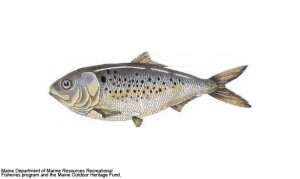
Despite their small size and plain appearance, menhaden have been called “the most important fish in the sea” because numerous coastal fish species rely on them for food. Although they aren’t typically eaten by humans, there is still a huge fishery for them for bait, aquaculture food, and oil. That fishery has been essentially unregulated, allowing fishermen to take as many as they want. Recently, there’s been a campaign among certain environmental groups to fix this problem and put catch limits in place for menhaden.
I was surprised to see PolitiFact, a non-partisan political fact-checking website, address this issue. I’ve checked PolitiFact pretty regularly for years, and I’ve never seen them cover a topic like this before. They focused on a claim by the Pew Environment Group that “In recent years, menhaden numbers along our coast have plummeted by 90 percent.” While I admit I am not familiar with specific details of menhaden population trends, anyone who has paid any attention at all to the ocean knows that we’re overfishing at alarming rates. According to the UN Food and Agriculture Organization, approximately 1/3 of all global fisheries are depleted or overexploited, many by more than the 90% referenced for menhaden. Shockingly, PolitiFact called the claim by Pew “mostly false”. Their reasoning for this ruling is even more ridiculous than the ruling itself:
Read More “PolitiFact calls claims of menhaden declines “Mostly False”, is completely wrong” »
